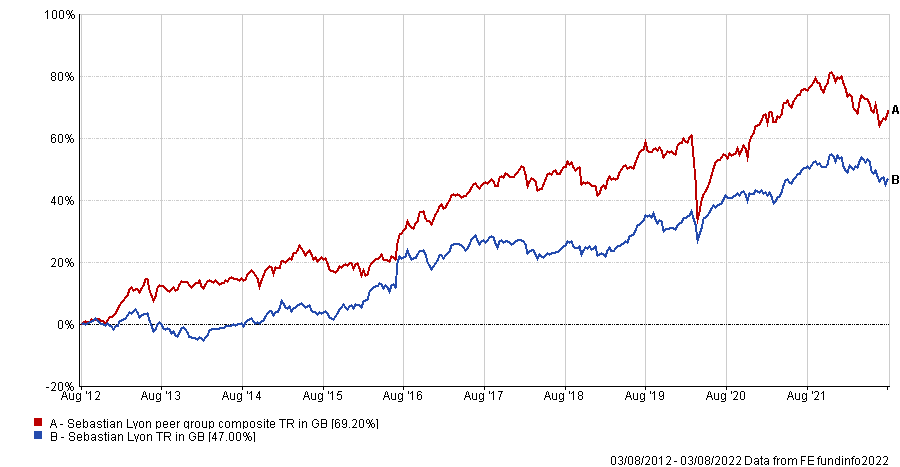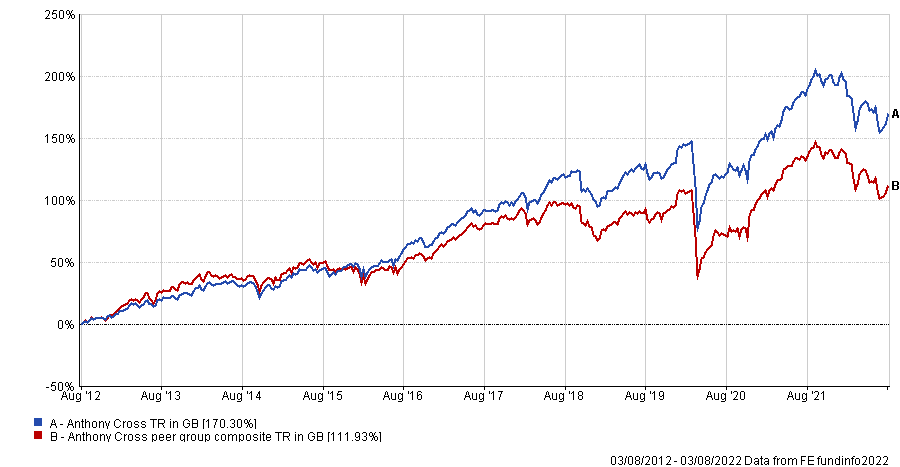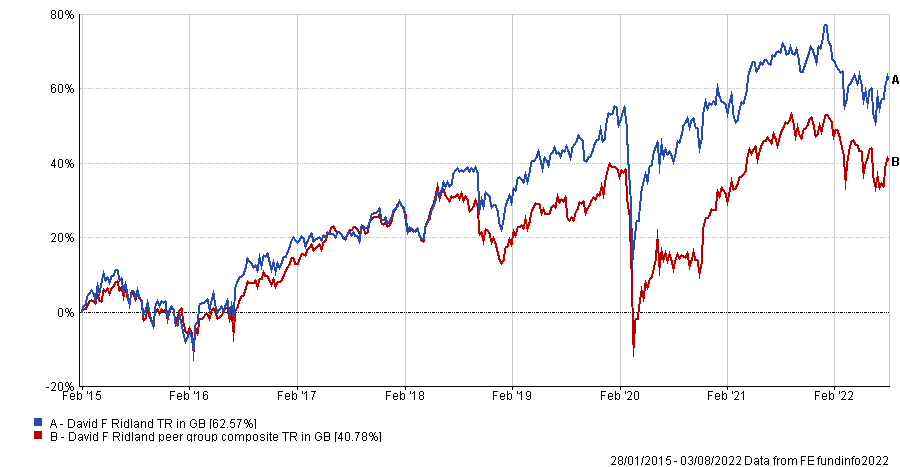Comparing a fund’s performance against that of its rivals is one of the first pieces of research carried out by investors, but how much weight should really be put on relative performance?
Murray International’s Bruce Stout told Trustnet earlier this year that “relative performance is destroying our industry” as too many investors look for the funds at the top of the table without understanding the individual nature of their portfolios or what is driving returns.
Charles Stanley Direct chief analyst Rob Morgan agrees that relative performance shouldn’t be the main focus of research.
“The problem with relying on relative performance is that shorter-term movements are often driven by style factors. A manager can outperform through luck just as much as they can through skill, so past performance can only ever tell part of the story,” he said.
“Relying on it means judging decisions based on the results rather than the quality of the process itself. This overemphasises the outcome and de-emphasises the circumstances that led to that outcome.”
With this in mind, Trustnet asked five experts how important relative performance is to their fund selection process and what other considerations should carry more weight.
Charles Stanley’s Rob Morgan: “Flip-flopping between styles wouldn’t be useful”
“Fund managers should have a set process that is consistently applied. Flip-flopping between styles wouldn’t be useful as investors would have no idea about what sort of environment they might outperform or underperform in,” Morgan said.
Periods of underperformance are inevitable, as all styles go through bad as well as good periods, so it is important to look over long periods to see whether managers add value or not, he added.
“Not losing focus or being distracted by short-term past performance or noise is really important. More experienced managers, who have witnessed multiple investment cycles in real time, may find this comes more naturally. There isn’t really a metric for this. A qualitative look at the consistency and an investment process and decision making is the most useful tool, and evaluating experience is one part of it.”
Investors who want to participate in long-term growth but don’t want to suffer big drawdowns along the way should look for funds with a capital-preservation mentality, said Morgan.
“Strategies that do this include Ruffer Investment Company and Personal Assets Trust by Sebastian Lyon. Although they are not going to maximise stock market returns, and thus often lag in relative terms, having complete freedom to invest according to their principles and put not losing money and controlling volatility ahead of beating a benchmark does align them with the requirements of a lot of investors.”
Manager’s performance over 10yrs against peer group

Source: FE Analytics
Evelyn Partners’ Jason Hollands: “In the real world clients do not set out to beat a benchmark”
Jason Hollands, managing director and corporate affairs head at Evelyn Partners, takes a similar approach and favours managers with satisfying long-term relative performance who also have a strong belief in capital preservation and, above all, have a clear and well-articulated investment process.
“In the real world clients do not set out to beat a benchmark index: they want to preserve and grow their capital in real terms over time. There are a number of ways fund managers can do this, but a key one is preparing to raise cash weightings when they consider markets are overpriced or the outlook is concerning or position in more defensive asset classes or sectors,” he said.
Like Morgan, Hollands also mentioned Sebastian Lyon’s Personal Asset as an example of a trust with a strong emphasis on capital preservation which invests across equities, index-linked bonds, gold and liquidity.
“While it won’t shoot the lights out in a bull market, it will protect on the downside.”
Tyndall’s James Sullivan: “Fund managers good and bad get chewed up and spat out on a regular basis”
James Sullivan, head of partnerships at Tyndall Investment Management, thinks a benchmark “empowers the asset allocator and gives guidance and visibility on portfolio structure and direction of travel”. But fund managers should not deviate from their process if they start to slip behind it.
“It is always too easy to blame an underlying manager for underperformance, whether it be relative or absolute. What destroys our industry is a lack of accountability at portfolio manager level. Fund managers must invest with conviction in line with their stated philosophy and be ready to stand by their processes when they face headwinds and fall behind a peer group benchmark.”
Performance and process are two of the four P’s of Sullivan’s portfolio selection strategy, with potential and pedigree completing the list.
Pedigree means favouring managers who exhibited longevity: “The market is very unforgiving and fund managers good and bad get chewed up and spat out on a regular basis. Value can be achieved by backing managers that have seen more than one cycle and one monetary policy backdrop.”
“That said, we also want to identify managers who still have the hunger and the desire to deliver real returns rather than protect historic performance. We want every inch of their performance to matter. Hunger is a little like the elastic in your socks – once it’s gone, it’s gone.”
Asked to pick a favourite, Sullivan also selected FE Alpha Manager Sebastian Lyon. “I have been fortunate to have known him since I was 20 and to badly paraphrase Mark Twain: ‘I am astonished at how much he has learned in 20 years.’”
Quilter Investors’ Sacha Chorley: “If we were to buy a UK equity fund, we want to know that it performs as UK equity does”
When Sacha Chorley, portfolio manager at Quilter Investors, allocates to a manager, he is generally trying to get exposure to their relative performance.
“If we were to buy a UK equity fund, we want to know that it performs as UK equity does, and on top of that we’d like to see incremental alpha from the underlying manager,” he said.
In Chorley’s view, periods of underperformance are inevitable. When they occur, it is important to understand whether the underperformance is consistent with the expectations made during the research stage: namely, of what the process is and when that should mean underperformance could occur.
“We need to have confidence the manager will execute on their process, as that is really what we're buying, and that allows us to build the positions into the portfolio.”
As for a specific manager, Sacha highlighted the Economic Advantage team at Liontrust, headed up by Alpha Manager Anthony Cross.
“They are very clear with the types of companies they will buy because they have shown that those kinds of businesses have a good chance of delivering incremental growth over time. There will be down periods from time to time but the clarity of philosophy means that we are able to form reasonable expectations as to when they may out/underperform,” he said.
“Finally, they are very open with commentaries and updates to talk through decisions made and reasons why, and ultimately all of the above has been proven out through a very long track record of (positive) excess returns.”
Manager’s performance over 10yrs against peer group

Source: FE Analytics
GDIM’s Tom Sparke: “Relative outperformance is very important”
Preferring to hold funds for long periods, GDIM investment manager and director Tom Sparke too likes a manager who can perform throughout different market cycles and environments.
“We tend to look for managers who take on less risk and that have a defined philosophy. Relative outperformance is very important – moving down less in difficult periods means less ground needs to be made up and often leads to outperformance in the long term. We tend to look more at risk-adjusted returns for this reason, delivering 90% of an upswing but with 75% of the risk is much more attractive to us than the alternative.”
When it comes to manager appreciation, Sparke has had “long-held regard” for the VT Castlebay UK Equity’s team, run by David F Ridland.
Manager’s performance over 10yrs against peer group

Source: FE Analytics
Co-managed by Ben Edwards and Simon Blundell, BlackRock Sustainable Sterling Strategic Bond was also highlighted.
Lastly, Bryn Jones and his team on Rathbone Strategic Bond Fund have shown “an aptitude to achieve a high level of risk-adjusted returns and pro-active management”.
That said, one should be wary of blindly following a manager on prior reputation, “as investors in Neil Woodford, Philip Gibbs and Anthony Bolton have found to their cost”, warned Sparke.




